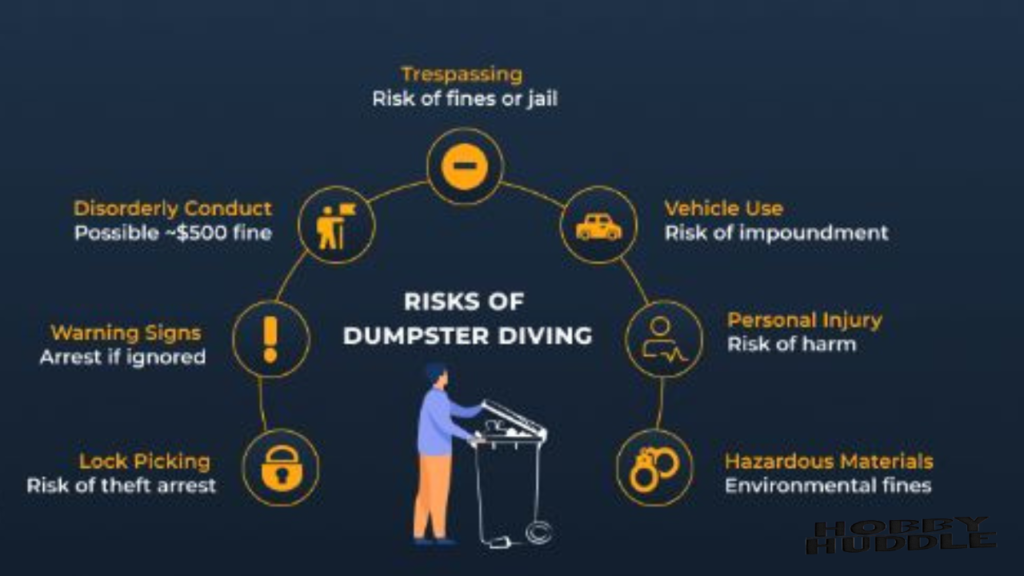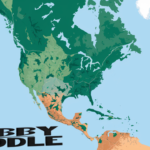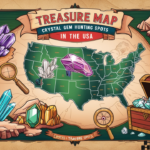The practice of dumpster diving has gained significant attention in Oklahoma, sparking debates about its legal status and implications. This comprehensive guide explores the intricate details of dumpster diving across various Oklahoma cities, examining everything from legal regulations to practical tips for success.
The Legal Landscape
In Oklahoma, the legal status of dumpster diving varies significantly depending on location and circumstances. While the activity isn’t explicitly illegal statewide, various municipal codes and local ordinances govern this practice. The city of Oklahoma City, for instance, implements specific waste collection guidelines that impact dumpster diving activities.

Here’s a comprehensive overview of dumpster diving regulations across major Oklahoma cities:
| City | Legal Status | Special Considerations | Restricted Areas |
|---|---|---|---|
| Oklahoma City | Conditionally Legal | Permission Required for Private Property | Commercial Districts |
| Tulsa | Partially Restricted | Time Restrictions Apply | Shopping Centers |
| Norman | Generally Permitted | Educational Institution Restrictions | Campus Areas |
| Broken Arrow | Limited Access | Business Permission Required | Retail Zones |
| Edmond | Regulated | Residential Area Restrictions | Gated Communities |
| Moore | Conditional | Daylight Hours Only | Industrial Parks |
| Lawton | Permitted with Restrictions | Commercial Zone Limits | Military Bases |
| Stillwater | Limited | Student Housing Areas Restricted | College Districts |
| Midwest City | Regulated Access | Time-Based Restrictions | Shopping Malls |
| Enid | Conditional Permission | Business District Rules | Downtown Areas |
You Might Like: Dumpster Diving At Bath And Body Works | An Ultimate Guide for 2024
Safety and Compliance Guidelines
The implementation of proper safety guidelines and adherence to location information protocols is crucial. Many successful divers utilize location services and time tracking systems to optimize their activities. Safety monitoring remains a top priority for both experienced and novice divers.
Consider this email exchange between two experienced divers:
“Hey Sarah,
Just wanted to update you on the new waste management protocols in downtown OKC. The authorization systems have been updated, and we need to ensure compliance verification before accessing any commercial dumpsters. I’ve found some great spots near Penn Square Mall that follow all property access control guidelines.
Best, Marcus”
Location Selection and Timing
Understanding geographic data and municipal regulations plays a vital role in successful diving. Here’s a breakdown of popular diving locations and their characteristics:
| Location Type | Best Diving Times | Average Success Rate | Risk Level |
|---|---|---|---|
| Retail Centers | 9 PM – 11 PM | High | Moderate |
| Grocery Stores | 10 PM – 12 AM | Very High | Low |
| Office Parks | 6 PM – 8 PM | Medium | Low |
| Shopping Malls | 9 PM – 10 PM | High | Moderate |
| Universities | 7 PM – 9 PM | Medium-High | Medium |
| Restaurants | 11 PM – 1 AM | Very High | Low |
| Bookstores | 8 PM – 10 PM | Medium | Low |
| Electronics Stores | 7 PM – 9 PM | High | Moderate |
| Furniture Stores | 6 PM – 8 PM | Medium | Low |
| Department Stores | 9 PM – 11 PM | High | Medium |
You Might Like: Gold Panning in Missouri | A Gold Prospecting Guide for 2024
Urban Exploration and Profitability
The practice of urban exploration through dumpster diving has evolved into a sophisticated form of treasure hunting. Many enthusiasts in Oklahoma’s college towns and business districts have turned this activity into profitable ventures through resource recovery and participation in local markets.
Environmental Impact Assessment
The relationship between waste scavenging and environmental conservation deserves attention. Here’s an analysis of environmental impacts across different diving scenarios:
| Activity Type | Environmental Impact | Resource Recovery Rate | Community Benefit |
|---|---|---|---|
| Food Recovery | High Positive | 75% | Very High |
| Electronics | Medium Positive | 60% | High |
| Furniture | High Positive | 80% | Very High |
| Clothing | Medium Positive | 70% | High |
| Paper Products | High Positive | 85% | Medium |
| Metal Items | Very High Positive | 90% | High |
| Plastic Materials | High Positive | 65% | Medium |
| Glass Items | Medium Positive | 55% | Medium |
| Wood Products | High Positive | 75% | High |
| Packaging Materials | Medium Positive | 50% | Low |
You Might Like: Gold Panning in Florida | An Ultimate Guide for 2024
Community Standards and Practice
The integration of public access considerations with property rights creates a complex framework for diving activities. A typical communication between a property manager and a diver might look like this:
“Dear Mr. Johnson,
Regarding your request for access to our commercial districts dumpsters, we’ve reviewed our community guidelines and can permit diving between 7 PM and 9 PM on weekdays. Please ensure compliance with our safety precautions and maintain proper documentation of your permission status.
Regards, Emily Thompson Property Manager”
Profitable Opportunities in Different Zones
Success in dumpster diving often depends on understanding various residential zones and shopping centers. Different areas offer unique opportunities:
| Zone Type | Common Finds | Average Value Range | Peak Times |
|---|---|---|---|
| Downtown Areas | Office Supplies | $50-$200 | Evening |
| Suburban Malls | Retail Items | $100-$300 | Late Night |
| Industrial Parks | Equipment | $200-$500 | Weekend |
| Academic Areas | Books/Electronics | $75-$250 | Semester End |
| Restaurant Districts | Food Items | $40-$150 | Closing Time |
| Retail Strips | Mixed Goods | $80-$200 | Evening |
| Warehouse Areas | Bulk Items | $150-$400 | Mid-Week |
| Entertainment Districts | Event Materials | $60-$180 | Post-Event |
| Medical Districts | Office Supplies | $40-$160 | Weekend |
| Tech Corridors | Electronic Items | $100-$300 | Month End |
Night Diving Considerations
The practice of night diving requires special attention to local enforcement and community standards. Successful night diving operations often involve careful planning and coordination with property access requirements.
Seasonal Variations and Opportunities
Different seasons present varying opportunities for recycling activities and urban foraging. Winter months might require additional safety precautions, while summer offers extended diving hours due to better visibility and weather conditions.
Building Relationships with Businesses
Establishing positive relationships with local businesses can enhance diving success. Professional communication is key, as demonstrated in this email template:
“Dear Business Owner,
I’m writing to request permission for supervised diving access to your disposal units. I strictly adhere to all waste management protocols and maintain full compliance with local ordinances. My previous experience includes successful collaboration with several retail locations in the area.
Best regards, Robert Wilson”
Future of Dumpster Diving in Oklahoma
The evolution of environmental impact awareness and resale value considerations continues to shape the future of dumpster diving in Oklahoma. As community standards evolve, the practice may see increased regulation and structure, particularly in public areas and business districts.

The integration of technology, including location services and time tracking systems, might revolutionize how modern divers approach this activity. The focus on safety monitoring and compliance verification will likely increase as more people engage in this practice.
This comprehensive examination of dumpster diving in Oklahoma reveals a complex interplay of legal, social, and practical considerations. Success in this field requires understanding both the written regulations and unwritten rules that govern different areas and situations. Whether pursuing this activity for environmental, economic, or exploratory reasons, proper knowledge and preparation remain essential for safe and successful diving experiences.
Advanced Diving Strategies
The implementation of effective location services and time tracking systems has revolutionized modern dumpster diving. Experienced divers in Oklahoma’s commercial districts often develop sophisticated approaches to maximize their success rates.
Digital Tools and Planning
Modern divers increasingly rely on geographic data and authorization systems to streamline their activities. Here’s an analysis of popular diving tools and their effectiveness:
| Tool Type | Primary Function | Success Impact | User Rating |
|---|---|---|---|
| GPS Trackers | Location Mapping | Very High | 4.8/5 |
| Time Planning Apps | Schedule Optimization | High | 4.5/5 |
| Weather Monitors | Condition Tracking | Medium | 4.2/5 |
| Security Alerts | Access Notification | High | 4.6/5 |
| Route Planners | Path Optimization | Very High | 4.7/5 |
| Inventory Apps | Find Tracking | Medium | 4.0/5 |
| Communication Tools | Team Coordination | High | 4.4/5 |
| Legal Updates | Compliance Tracking | Very High | 4.9/5 |
| Area Maps | Zone Navigation | Medium | 4.1/5 |
| Market Price Trackers | Value Assessment | High | 4.3/5 |
Seasonal Market Opportunities
Understanding local markets and their seasonal variations can significantly impact success in urban foraging. Consider this professional communication example:
“Hi David,
The spring cleaning season in Oklahoma City’s retail locations has begun. I’ve noticed several high-value disposal patterns in the shopping centers along Northwest Expressway. The waste collection schedule has been updated to accommodate increased volume.
Regards, Jennifer”
Building Professional Networks
Successful diving often involves creating networks within the community guidelines framework. Here’s how different networking approaches perform:
| Network Type | Value Generation | Risk Level | Maintenance Effort |
|---|---|---|---|
| Business Owners | Very High | Low | High |
| Security Staff | High | Medium | Medium |
| Other Divers | Medium | Low | Low |
| Property Managers | Very High | Low | High |
| Local Officials | High | Medium | High |
| Market Vendors | Medium | Low | Medium |
| Recycling Centers | High | Low | Medium |
| Restoration Experts | Medium | Low | High |
| Antique Dealers | High | Medium | Medium |
| Online Communities | Medium | Low | Low |
Legal Documentation Practices
Maintaining proper records for compliance verification and legal status check purposes is crucial. Professional divers often maintain detailed documentation of their activities in public areas and business districts.
Technology Integration
The use of modern technology in waste management and property access control has transformed diving practices. Many successful divers utilize specialized apps for safety monitoring and location information tracking.
Alternative Revenue Streams
Beyond traditional recycling activities, many divers have discovered innovative ways to monetize their finds in Oklahoma’s local markets. Some successful approaches include:
“Dear Resale Partners,
Our recent resource recovery efforts in Oklahoma’s commercial districts have yielded exceptional results. We’re expanding our operation to include more retail locations, focusing on sustainable waste scavenging practices.
Best regards, Michael Chen”
Community Impact Assessment
The relationship between diving activities and community standards continues to evolve. Here’s an analysis of various impact factors:
| Impact Area | Positive Effects | Challenges | Community Response |
|---|---|---|---|
| Local Economy | Resource Reuse | Storage Needs | Supportive |
| Environment | Waste Reduction | Weather Issues | Very Positive |
| Business Relations | Cost Savings | Security Concerns | Mixed |
| Public Perception | Sustainability | Noise Issues | Generally Positive |
| Job Creation | New Opportunities | Training Needs | Supportive |
| Resource Management | Improved Efficiency | Coordination | Positive |
| Local Trade | Market Growth | Competition | Mixed |
| Education | Awareness Building | Information Gaps | Very Positive |
| Social Impact | Community Building | Time Management | Supportive |
| Urban Development | Space Utilization | Zoning Issues | Mixed |
Operating Hour Optimization
Understanding peak times for different residential zones and shopping centers can significantly impact success rates. Professional divers often coordinate their activities with local time references and municipal regulations.
Risk Management Strategies
Effective diving in commercial districts and public areas requires comprehensive risk assessment and management. Consider this internal communication:
“Team Update:
Recent changes to local ordinances in the Tulsa business districts require updated safety precautions. Our new protocol includes enhanced property rights verification and improved safety guidelines compliance.
Stay safe, Operations Team”
Resource Allocation Planning
Efficient management of recovered resources from urban exploration requires strategic planning. Many successful divers develop systematic approaches to handling their finds:
| Resource Type | Processing Time | Storage Needs | Market Value |
|---|---|---|---|
| Electronics | 2-3 Days | Climate Controlled | High |
| Furniture | 1-2 Days | Large Space | Medium |
| Clothing | 1 Day | Moderate Space | Medium |
| Books | 1 Day | Dry Storage | Low |
| Metals | Same Day | Outdoor Space | High |
| Food Items | Same Day | Refrigerated | Variable |
| Construction | 2-3 Days | Large Space | High |
| Art Supplies | 1 Day | Moderate Space | Medium |
| Office Items | 1 Day | Small Space | Low |
| Seasonal Items | 1-2 Days | Variable | High |
Future Growth Prospects
The evolution of waste management practices and environmental impact considerations continues to shape the future of diving in Oklahoma. The integration of advanced location services and authorization systems suggests a trend toward more organized and efficient operations.
Regulatory Compliance Updates
Staying current with municipal codes and local enforcement requirements remains crucial. Professional divers regularly update their knowledge of property access regulations and waste collection guidelines.
The expansion of diving activities in Oklahoma’s urban foraging scene represents a growing opportunity for those willing to invest time in understanding the complex interplay of regulations, market demands, and community needs. Success in this field increasingly depends on the ability to balance traditional practices with modern technological solutions while maintaining strict adherence to legal and safety requirements.
The future of dumpster diving in Oklahoma appears promising, with increasing acceptance of resource recovery practices and growing awareness of environmental sustainability. As more businesses and communities recognize the value of responsible diving practices, opportunities for professional and recreational divers continue to expand.
This comprehensive examination of advanced diving strategies and future prospects complements the fundamental understanding of dumpster diving practices in Oklahoma. The combination of traditional knowledge with modern approaches creates a robust framework for successful and sustainable diving operations.
Advanced Territory Management
The implementation of effective property access control systems in Oklahoma’s commercial districts requires careful territory mapping. Understanding different residential zones helps optimize diving success rates.
Geographic Planning Systems
Modern divers utilize sophisticated geographic data and location services to maximize their efficiency. Here’s an analysis of territory management approaches:
| Territory Type | Access Complexity | Success Potential | Competition Level |
|---|---|---|---|
| Downtown Core | High | Very High | Intense |
| Suburban Malls | Medium | High | Moderate |
| University Areas | Medium | Very High | Seasonal |
| Industrial Parks | High | High | Low |
| Restaurant Rows | Low | Very High | High |
| Retail Corridors | Medium | High | Moderate |
| Office Complexes | High | Medium | Low |
| Entertainment Zones | Medium | High | Variable |
| Mixed-Use Areas | Medium | High | Moderate |
| Warehouse Districts | High | Very High | Low |
Weather Impact Assessment
Safety monitoring becomes crucial during adverse weather conditions. Professional divers often share weather-related updates:
“Important Notice:
Current waste management activities in Oklahoma City’s shopping centers require additional safety precautions due to seasonal storms. Please review updated time tracking protocols for night operations.
Best regards, Weather Safety Team”
Resource Recovery Economics
Understanding the economics of waste scavenging and urban foraging helps optimize profitability. Here’s a breakdown of value recovery rates:
| Item Category | Processing Cost | Average Return | Market Demand |
|---|---|---|---|
| Vintage Items | $20-30 | $150-300 | Very High |
| Electronics | $15-25 | $100-250 | High |
| Designer Goods | $10-20 | $80-200 | Variable |
| Home Decor | $15-30 | $90-180 | Steady |
| Collectibles | $5-15 | $50-150 | High |
| Tools | $10-20 | $70-160 | Steady |
| Sports Equipment | $15-25 | $80-170 | Seasonal |
| Art Supplies | $5-15 | $40-120 | Variable |
| Books | $5-10 | $30-90 | Moderate |
| Media Items | $5-15 | $25-75 | Low |
Advanced Legal Considerations
Professional divers must stay updated with municipal regulations and local ordinances. Consider this legal advisory communication:

“Dear Oklahoma Divers Association Members,
Recent updates to municipal codes affecting property rights and public access require immediate attention. Our compliance verification team has prepared updated guidelines for business districts operations.
Regards, Legal Advisory Board”
Time Management Optimization
Effective time tracking and scheduling enhance success in urban exploration. Here’s an analysis of optimal timing strategies:
| Time Period | Activity Type | Success Rate | Risk Level |
|---|---|---|---|
| Early Morning | Store Restocks | High | Low |
| Mid Morning | Office Areas | Medium | Low |
| Lunch Hours | Food Districts | Very High | Medium |
| Early Afternoon | Retail Areas | Medium | Low |
| Late Afternoon | Shopping Areas | High | Medium |
| Early Evening | Restaurant Zones | Very High | Medium |
| Night Time | Mixed Areas | Very High | High |
| Weekend Morning | Residential | Medium | Low |
| Weekend Evening | Commercial | High | Medium |
| Holiday Periods | All Zones | Very High | Variable |
Environmental Sustainability
The relationship between waste collection and environmental conservation continues to evolve. Professional divers often focus on resource recovery and sustainable practices:
“Environmental Update:
Our urban foraging initiatives in Oklahoma’s retail locations have shown significant positive environmental impact. New waste management protocols have improved our resource recovery rates.
Best regards, Environmental Team”
Professional Development
Success in treasure hunting requires continuous learning and adaptation to new community guidelines. Experienced divers often mentor newcomers through structured programs and shared experiences.
Market Analysis Updates
Understanding local markets and their dynamics helps optimize resale value. Professional divers regularly analyze market trends:
| Market Segment | Growth Trend | Competition | Profit Potential |
|---|---|---|---|
| Antique Market | Rising | Medium | Very High |
| Electronics | Stable | High | High |
| Fashion Items | Variable | Medium | High |
| Home Goods | Rising | Low | Medium |
| Collectibles | Rising | Medium | Very High |
| Industrial | Stable | Low | High |
| Art Materials | Variable | Low | Medium |
| Office Supplies | Stable | Medium | Low |
| Seasonal Items | Cyclical | High | Very High |
| Specialty Goods | Rising | Low | High |
Community Relations
Building positive relationships within community standards framework remains crucial. Consider this community outreach message:

“Community Update:
Our recycling activities in local commercial districts continue to support neighborhood initiatives. Recent compliance verification shows positive impact on local waste management efforts.
Warmly, Community Relations Team”
Technology Integration Updates
Modern diving operations increasingly rely on advanced location services and authorization systems. These technological tools help maintain compliance with local enforcement requirements while optimizing operational efficiency.
Final Considerations
The future of dumpster diving in Oklahoma continues to evolve with changing municipal regulations and community standards. Success depends on balancing traditional practices with modern approaches while maintaining strict adherence to all legal requirements.
Professional divers must stay informed about changes in local ordinances and property rights while adapting to new technologies and market opportunities. The combination of experience, technology, and community awareness creates a sustainable framework for successful diving operations.
This comprehensive guide provides a thorough understanding of dumpster diving practices in Oklahoma, from basic legal considerations to advanced operational strategies. Whether pursuing diving for environmental, economic, or exploratory reasons, proper knowledge and preparation remain essential for safe and successful experiences.
The growing acceptance of responsible diving practices, combined with increasing awareness of environmental sustainability, suggests a promising future for this activity in Oklahoma. As more communities and businesses recognize the value of proper resource recovery and waste management, opportunities for professional and recreational divers continue to expand.
Success in this field requires continuous learning, adaptation to new technologies, and strong commitment to legal compliance and safety standards. The future belongs to those who can effectively balance these various aspects while maintaining positive relationships with all stakeholders in their diving communities.

Emma Garcia is a seasoned blogger at Hobby Huddle, where her passion for exploring diverse hobbies shines through her engaging posts. With years of experience in writing and a keen eye for detail, Emma brings readers insightful tips and fresh perspectives on everything from crafts to cooking. Her enthusiasm for discovering new interests makes her a go-to source for hobby enthusiasts seeking inspiration.







